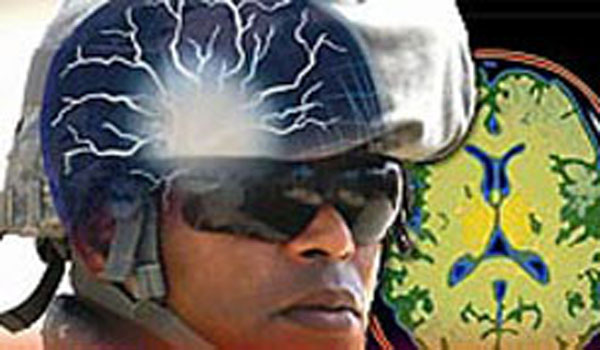
The Brain Could Become the Ultimate Weapon
Emma Young
As the sun sets over a desert riddled with enemy fighters, a solitary Special Forces officer slips on his helmet.
He chooses his next move, and his thoughts are transmitted silently to the rest of his unit. As he picks up his weapon, his helmet reads his thoughts, directing an autonomous combat robot positioned nearby to cover his advance. A continuous data stream from his brainwave-monitoring helmet transmits feedback on his stress levels and the information load on his brain to his commanding officer.

Thanks to a skin patch delivering drugs into the bloodstream, his stress levels are in check, and, despite sleeping for just two of the past 72 hours, he’s still thinking clearly. Besides, when he enrolled for duty he was screened for his ability to manage highly stressful situations, and his brain scans showed him to be a calm, fast-thinking risk-taker – the perfect soldier.
This scenario sounds futuristic, and to some extent it still is. But recent advances in neuroscience are bringing many of these concepts closer to reality, and prototypes of some of these systems are available now. While the 20th century saw a revolution in weaponry, military engagements of the 21st century could be transformed by a new focus on the brain.
Brain-scanning helmets, neural stimulation and drug enhancement are part of this revolution. “We’re on the threshold of all these things,” says Rod Flower, a biochemical pharmacologist at Queen Mary, University of London. “In the future, the scope for neuroscience to give a military advantage could be very large.”
In early 2012, Flower chaired a British Royal Society group that wrote a report on neuroscience’s potential for military uses. A few years earlier, the U.S. Army commissioned the U.S. National Research Council (NRC) to produce a report on the topic.
Featuring predictions and hopes for the future, the report concluded that “a growing understanding of neuroscience offers huge scope for improving soldiers’ performance and effectiveness on the battlefield”. Right now, research groups around the world either run or funded by military organisations are conducting research and field trials on everything from drugs that boost reaction times to binoculars that tap into their wearer’s unconscious mind.
The potential of neuroscience to aid the military begins at the screening stage. Soldiers applying to join the Australian Special Air Service Regiment, for example, have to undergo basic checks of their psychological and physical fitness and then a three-week selection course during which their commanding officers assess their individual attributes – such as their leadership skills, their response to stress and their ability to work well in a small team.
Only 16% of applicants are ultimately accepted. Brain scanning, such as functional magnetic resonance imaging (fMRI), could quickly and cheaply weed out those who are unlikely ever to make it, and pick up potential future problems in candidates who are selected – as well as identifying soldiers who are most likely to excel.
So what characteristics might these candidates possess? They need to be able to deal well with stress and to make instant decisions in complex, dangerous situations. Fighter jet pilots must monitor things like air speed and fuel availability while thinking about the location of their potential enemy and simultaneously firing missiles.
Foot soldiers, meanwhile, may be faced with situations where they have to make decisions that can result in life or death – or at least the destruction of multimillion-dollar pieces of machinery.
When soldiers get this wrong and respond badly to stress, the results can be tragic – ranging from incidents of friendly fire to war crimes. The U.S. soldier who broke into three homes and killed 16 civilians, including women and children, in March 2012 in Kandahar, Afghanistan, was reportedly being treated for stress, suffering from severe nightmares, flashbacks of war scenes and persistent headaches after multiple combat tours in Iraq.
In 2008, the RAND Corporation found that nearly 20% of military service members returning to the U.S. from Iraq and Afghanistan reported symptoms of post-traumatic stress disorder or major depression. In 2009, U.S. Army sergeant John Russell was charged with shooting five colleagues dead. He had completed a 15-month tour of Iraq and was being treated for stress before the attacks.
Finding ways to filter out people who don’t cope with the stresses of war would be invaluable for any military organisation, says Flower.
“At the moment, it’s done really by a process of trial and error – you put soldiers, sailors and airmen through stressful situations to see how they behave and remove the ones you don’t think can cut it and perhaps give them another job,” for example as a peacekeeper in a civilian area, he says. “If there was a way you could do that simply with a half-hour test, that would save a lot of time and money as well as, hopefully, improving the success rate.”
There’s already progress towards this goal. Research by the Uniformed Services University in Bethesda, Maryland, on members of the U.S. Navy applying to become Navy SEALS has found that cadets less likely to complete the training are those whose scans reveal an intense reaction to stress by their hypothalamopituitary axis – part of the brain involved in the stress response.
Meanwhile, Robert Ursano, a psychiatrist and neuroscientist also at the Uniformed Services University, suggests that a person’s total number of serotonin receptors might play a role in predicting their response to stress. Serotonin is a key neurotransmitter, or chemical that transfers signals between nerve cells, that is involved in the reward circuit.
Brain scans might also detect the fastest learners. Scott Grafton, a neuroimaging specialist at the University of California Santa Barbara, has found that fMRI can identify people with more flexible brain networks, and that this flexibility helps to predict how quickly they can learn a new task.
Read More: Here
